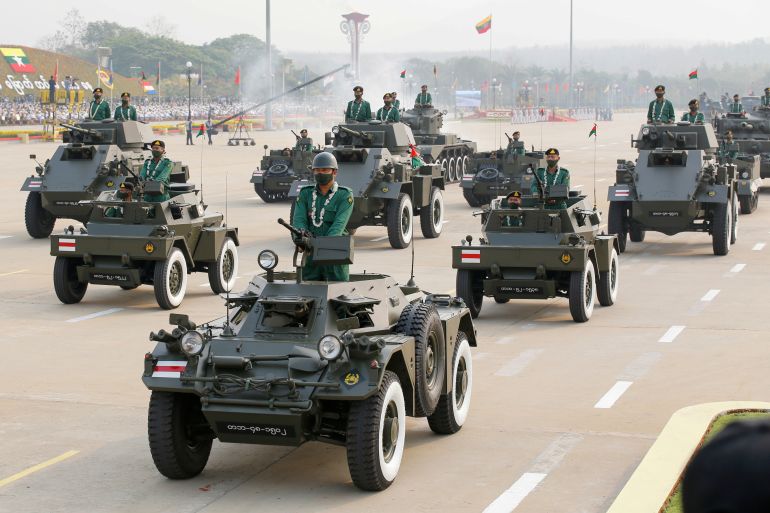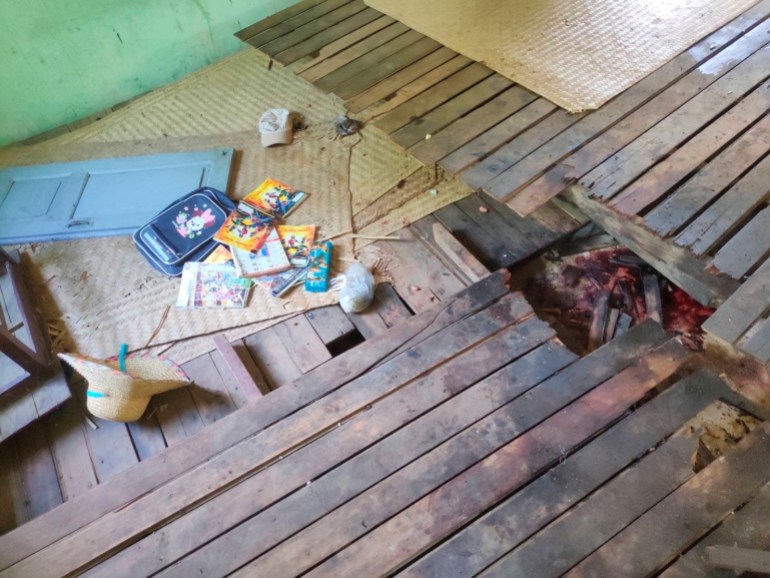Call for action on Myanmar as at least 11 killed in school attack
At least 11 children killed in military raid, as UN, ASEAN consider tougher measures to deal with crisis triggered by coup.

Southeast Asian nations must decide whether a five-point plan to end the violence in Myanmar is “still relevant”, Malaysia’s Foreign Minister Saifuddin Abdullah has said, as reports emerged that at least 11 children had been killed in a military airstrike on a school.
Myanmar was plunged into crisis when the military detained elected civilian leader Aung San Suu Kyi and seized power. It has cracked down hard on any opposition, describing civilian and ethnic armed groups fighting against its rule as “terrorists” and executing four political prisoners in July.
Keep reading
list of 4 itemsWho represents Myanmar? UN faces credentials pressure at assembly
UN investigator says Myanmar post-coup abuses a ‘major focus’
Myanmar’s Min Aung Hlaing meets Putin for first time since coup
The Association of Southeast Asian Nations (ASEAN) brokered a five-point framework with army chief Min Aung Hlaing in April 2021 that was supposed to end the violence, but the generals have ignored it.
Saifuddin said ASEAN, whose leaders are due to meet in less than two months, were now at the point where they needed to “seriously review” whether the plan was “still relevant” or whether “it should be replaced with something better”.
Myanmar is one of ASEAN’s 10 members and the international community has been relying on the organisation to take the lead in diplomatic efforts to deal with the crisis.
“By the time we meet in November, we must ask that hard question and we must have the answer,” he said.
School attacked
There has been no let-up in violence since the ASEAN agreement, and the Assistance Association for Political Prisoners, which has been tracking the crackdown, says nearly 2,300 people have been killed by the military since the coup.
On Friday, at least 11 children were killed in “an airstrike and indiscriminate fire in civilian areas, including a school”, in the northern central Sagaing region, the UN children’s fund said in a statement, adding that at least 15 children from the school were still missing.
Save the Children said there were reports of 17 others injured.
At least 11 schoolchildren killed in Myanmar attack @unicef https://t.co/wJMepjEac2
— Paloma Escudero (@PalomaUnicef) September 19, 2022
STATEMENT: Save the Children is horrified by reports that at least 11 children were killed & 17 others injured in an attack on a school in Myanmar.
We condemn the attack in Depayin, Sagaing Region, in the strongest possible terms. pic.twitter.com/YJ8noHXfOU
— Save the Children Australia News (@SaveAusNews) September 20, 2022
“They kept shooting into the compound from the air for an hour,” the school’s administrator Mar Mar told the Associated Press news agency. ”They didn’t stop even for one minute. All we could do at that time was chant Buddhist mantras.”
The National Unity Government (NUG), made up of elected politicians who were thrown out of office by the military, accused the generals of “targeted attacks” on schools and called for the release of 20 students and teachers it said had been arrested following the air raids.

In a statement acknowledging that some villagers had been killed in the attack, the military said it raided the compound because armed groups were hiding there and using it for the transport of weapons.
It said soldiers had conducted “a surprise inspection” and were attacked by fighters from the ethnic Kachin Independence Army and a People’s Defence Force (PDF) who had hidden inside.
Myanmar’s PDF forces were established by the NUG in the wake of the mass protests triggered by the coup, to fight against military rule. The generals have dismissed them as “terrorists”.
Amid the continuing attacks, the UN Security Council is due to consider a United Kingdom-drafted resolution — circulated on Friday — that would demand an end to all violence in Myanmar, call for an immediate end to the transfer of arms to Myanmar and threaten UN sanctions.
It would also call on the military to release all political prisoners, including Aung San Suu Kyi, implement the ASEAN peace plan and allow for a democratic transition.
To be adopted, the resolution would need at least nine votes in favour, and for none of the five permanent members to exercise their veto. Russia, which has a veto, has continued to show its support for the military with President Vladimir Putin meeting army chief Min Aung Hlaing earlier this month.
Malaysia’s Saifuddin, meanwhile, also called on ASEAN to adopt a more “inclusive” approach to dealing with the crisis that some have likened to a civil war.
Sitting alongside representatives of the NUG, Saifuddin said ASEAN should speak to “all stakeholders” in its efforts to end the crisis.
Although ASEAN has barred the generals from its major summits, Saifuddin is currently the only foreign minister from the grouping to have met the NUG.
“There should be an inclusive and fair consultation with all stakeholders in Myanmar, including the NUG and NUCC. Then there should be a framework with a clear endgame, which includes a return to democracy in Myanmar,” Saifuddin said, referring to the government established by the elected politicians removed in the coup, and the National Unity Consultative Council, which includes the NUG, elected politicians, ethnic political parties and armed groups, and civil society.
The NUG has stepped up efforts to achieve international recognition.
Kyaw Moe Tun, the UN ambassador appointed by the civilian government, remains in his post despite military objections, and the credentials committee is due to consider the issue.
“The Myanmar people deserve to have their true representatives at the table where regional decisions are being made,” said NUG spokesperson Htin Linn Aung, who appeared alongside Saifuddin.